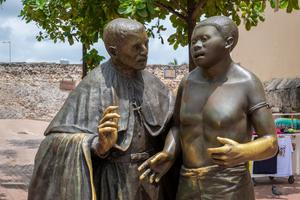Church Commission Investigates Baltimore Archdiocese Role in Slavery
The commission, which is still in its early stages, includes academics, archivists and other researchers who are poring through old documents for information on the subject.

A 17-member commission created by the Archdiocese of Baltimore will investigate the roles that bishops, clergy and other prominent Catholic figures within the archdiocese played in American slavery.
The commission, which is still in its early stages, includes academics, archivists and other researchers who are poring through old documents for information on the subject. The commission first met in March and hopes to unveil some of its findings to the public within the fall of this year.
“It’s striking that … Catholics, clergy and lay, are people of their times and accepted the institution of slavery as just part of life in America,” Bishop Bruce Lewandowski, an auxiliary bishop in the archdiocese, told CNA. “It’s very sad to say that.”
Bishop Lewandowski said the commission is engaging in “significant research” at the moment and said the goal is to eventually make the history known to the public. Although the means by which they will unveil the information are yet to be decided, he said it could be through articles, presentations, a web page online, or something in document form.
The archdiocese will also use the material for education within churches and schools.
“[We plan to] use it, for example, at the parish level, in Catholic schools, [in the] seminary, [in] education [and] formation so the history is known,” Bishop Lewandowski said.
In addition to education, Bishop Lewandowski added that the archdiocese intends to “prayerfully reflect” on the information, and the commission will provide recommendations on “atonement and reparations” for the role of the archdiocese in slavery.
“This is part of an ongoing process … of coming to terms with racism in the present by looking deeply in the past,” Lewandowski said.
“We also want to engage the community … [and] evaluate the efficacy of our approaches to systemic racism in the archdiocese,” Bishop Lewandowski continued.
The idea for a commission sprang from a working group that developed into a permanent structure in the archdiocese called the Racial Justice Coordinating Council. The group, which interviewed nearly 80 people about their experiences with racism within the archdiocese, provided recommendations on racial justice. At a later date, the council requested a serious study into the archdiocese’s participation in slavery.
“That working group came up with a significant number of recommendations for the archbishop to implement,” Bishop Lewandowski said. “And those fell into different categories: education, clergy and seminary formation, the Catholic Center and its internal workings. So, a number of different recommendations.”
Bishop Lewandowski added that the participation in slavery is part of the history of the archdiocese, and “we need to continually address it.”
“This is just part of the next phase.”
- Keywords:
- slavery
- archdiocese of baltimore















